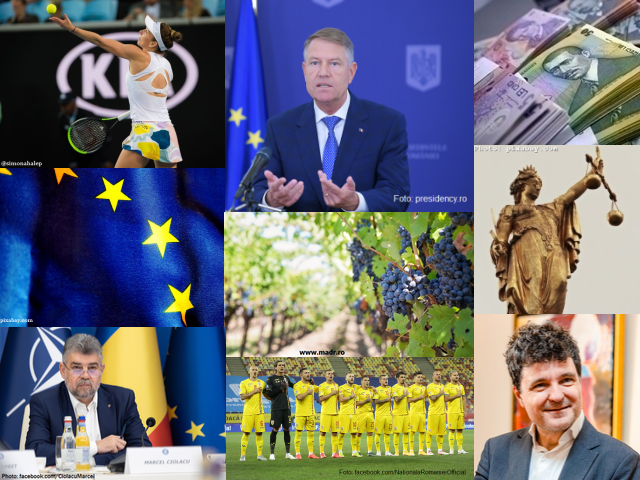THE WEEK IN REVIEW
December 4-8, 2023

Ştefan Stoica, 09.12.2023, 14:00
Measles epidemic
For the second time in 7 years, a measles epidemic was declared in Romania, a decision made by specialists after approximately 2,000 cases were registered since the beginning of the year. The Minister of Health, Alexandru Rafila, stated that this public health measure makes it possible to accelerate the vaccination campaign for children, including at a younger age, 9-11 months. How did it get here? The sustained transmission of measles virus infection in the community is caused by the accumulation of a receptive mass of children who have not been vaccinated, Minister Rafila explained. Currently, vaccination coverage is low, 78% for the first dose, 62% for the second dose. The head of healthcare announced the launch of a campaign through mass media, public health departments, and family physicians to explain to parents the importance of vaccination. Rafila warned that, if there is no more vaccination coverage, other contagious infectious diseases, considered eradicated, may reappear. The first measles epidemic brought to light a strong anti-vaccine trend, which also manifested during the coronavirus pandemic. Measles is a childhood disease that produces a mortality that varies between 1 and 3 per thousand.
Former prime minister and party leader indicted
The former prime minister and leader of the PNL, Florin Cîţu, was placed under criminal investigation by the National Anticorruption Directorate for complicity in abuse of office. He was questioned, this week, in the case of the acquisition of vaccines during the pandemic. Currently a senator, Florin Cîţu lost his parliamentary immunity last week. Investigators accuse the leader of the executive in the second year of the pandemic that, in the first half of 2021, he approved two memoranda that generated additional purchases of anti-COVID vaccines. This, given that, according to anti-corruption prosecutors, tens of millions of doses had been purchased by the Ministers of Health at that time, and there were no studies and data to support the purchase of new batches of vaccine. The damage is estimated at over one billion euros. After the hearings, Florin Cîţu claimed that he fulfilled his duties in compliance with the legislation. The vaccine case also involves the previous Ministers of Health, Vlad Voiculescu and Oana Mihăilă, who represented USR in the government.
The current prime minister visits Washington
The current prime minister and very likely PSD presidential candidate next year, Marcel Ciolacu, made a working visit to Washington. He had a dense schedule, which mainly included meetings with the Secretaries of State, Defense and Energy, with members of the American Congress, and representatives of the diaspora, as well as a visit to the Holocaust Memorial. Romanias Strategic Partnership with the United States is and will remain one of the pillars of Bucharests foreign and security policy, Marcel Ciolacu emphasized in Washington. He supported the need to strengthen NATOs position in the Black Sea region, at the same time pleading in favor of an increased presence of the American military in Romania. The Prime Minister also met with representatives of the defense industry in the United States, namely the Lockheed Martin company, on which occasion he emphasized the importance of collaboration in the evaluation and development of capabilities in the national defense industry. On the economic level, the head of the Executive confessed that he wants the United States to be Romanias main non-EU partner. As long as the United States is deploying more than 2,000 American soldiers and state-of-the-art military logistics on the territory of Romania, I believe that we can also create a hub for American companies in the economic area, which naturally leads to the development of Romania, Marcel Ciolacu stated. Regarding the inclusion of the country in the Visa Waiver program, perhaps as early as 2025, the Romanian Prime Minister said that there is political support in Washington, and that only one technical criterion remains to be met, namely a small number of rejected visa applications.
Romania at the climate summit in Dubai
Romania was represented at the United Nations Framework Convention on Climate Change, which was hosted for three days in Dubai by President Klaus Iohannis and the Minister of Energy, Sebastian Burduja. In one of the interventions, the head of state declared that Romania has some of the lowest emissions of greenhouse gases per capita in the European Union, and is firmly committed to accelerating measures to mitigate climate change. By 2030, Bucharest aims to reduce emissions by approximately 80% compared to the 1990 level and to rapidly move towards climate neutrality. By 2050 at the latest, Romanias national energy mix will consist of 86% renewable energy, complemented by energy with low carbon emissions, such as nuclear energy. On the occasion of the climate summit, Romania joined the International Solar Alliance, a move that, according to Iohannis, will contribute to increasing national energy security and confirms the countrys firm commitment to become carbon neutral, including through the use of renewable sources energy. By 2030, Romania aims to install a solar energy capacity of over 8 gigawatts, representing 24% of the gross final consumption of electricity from renewable sources. Romania has the largest solar potential in southeastern Europe; studies show that it could exploit up to 18-20 gigawatts of solar power, says the Minister of Energy, Sebastian Burduja. A declaration on the tripling of nuclear energy capacity worldwide was also launched in Dubai. Romania undertakes to complete two new CANDU units at the Cernavodă Power Plant (south-east), and to build and implement small modular reactors.



























